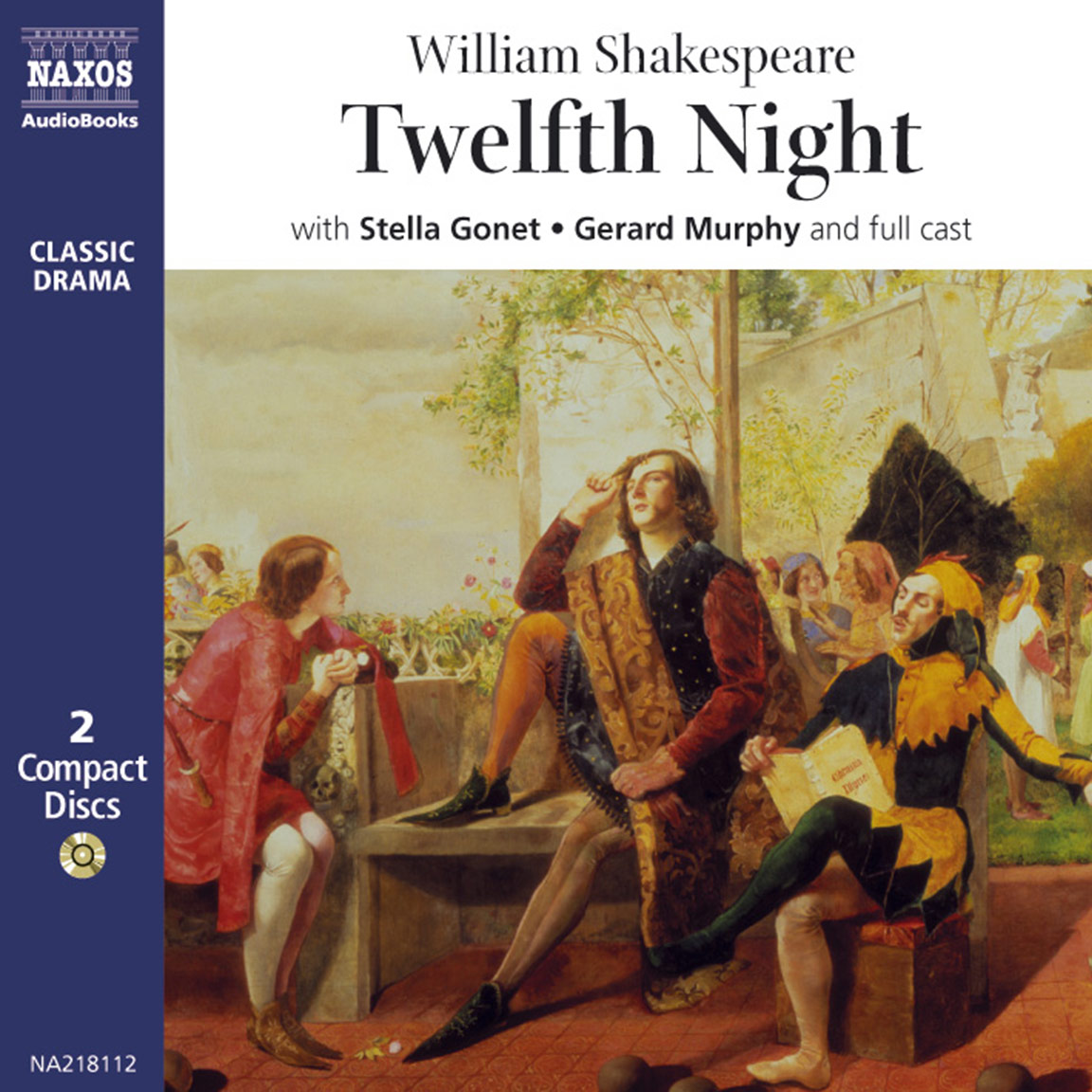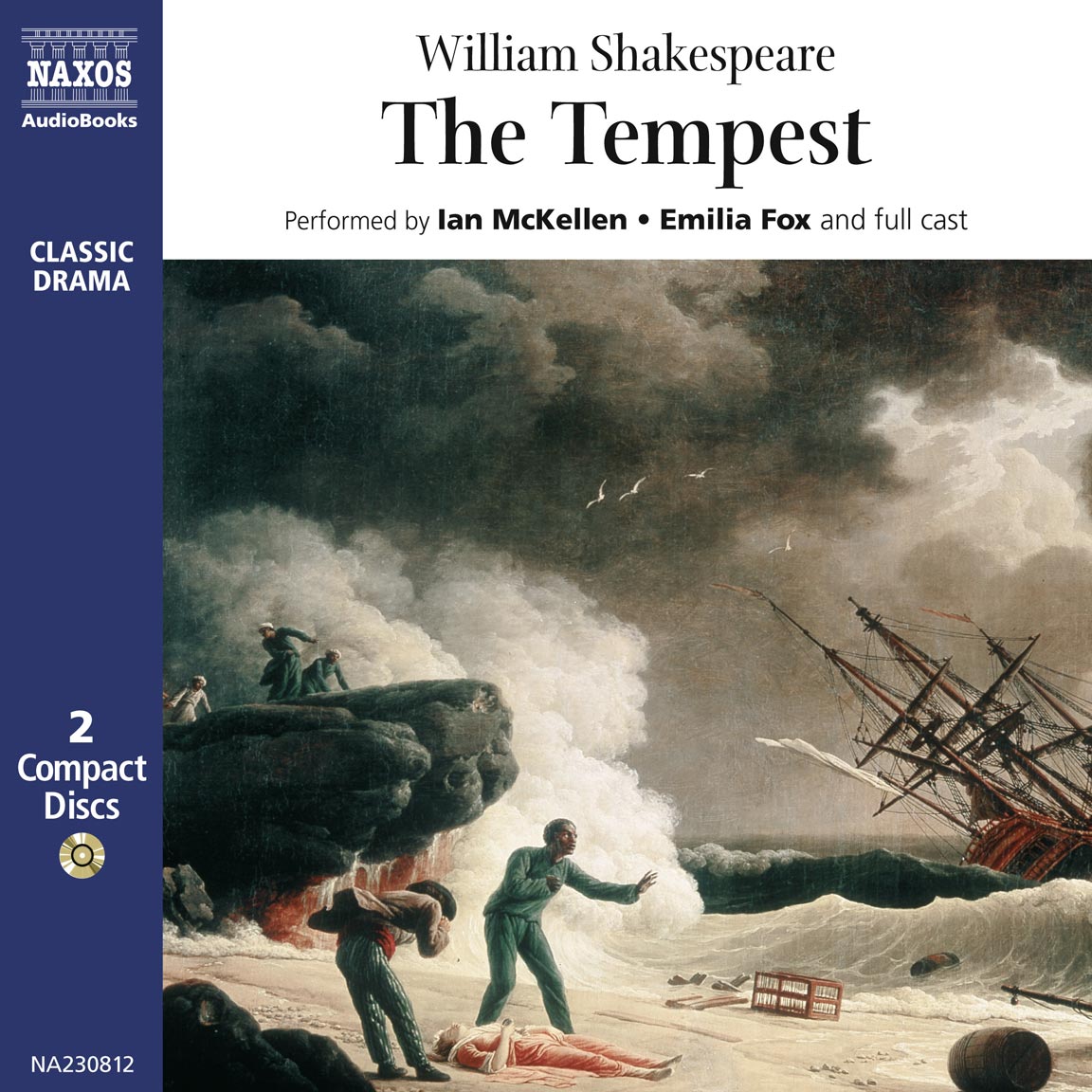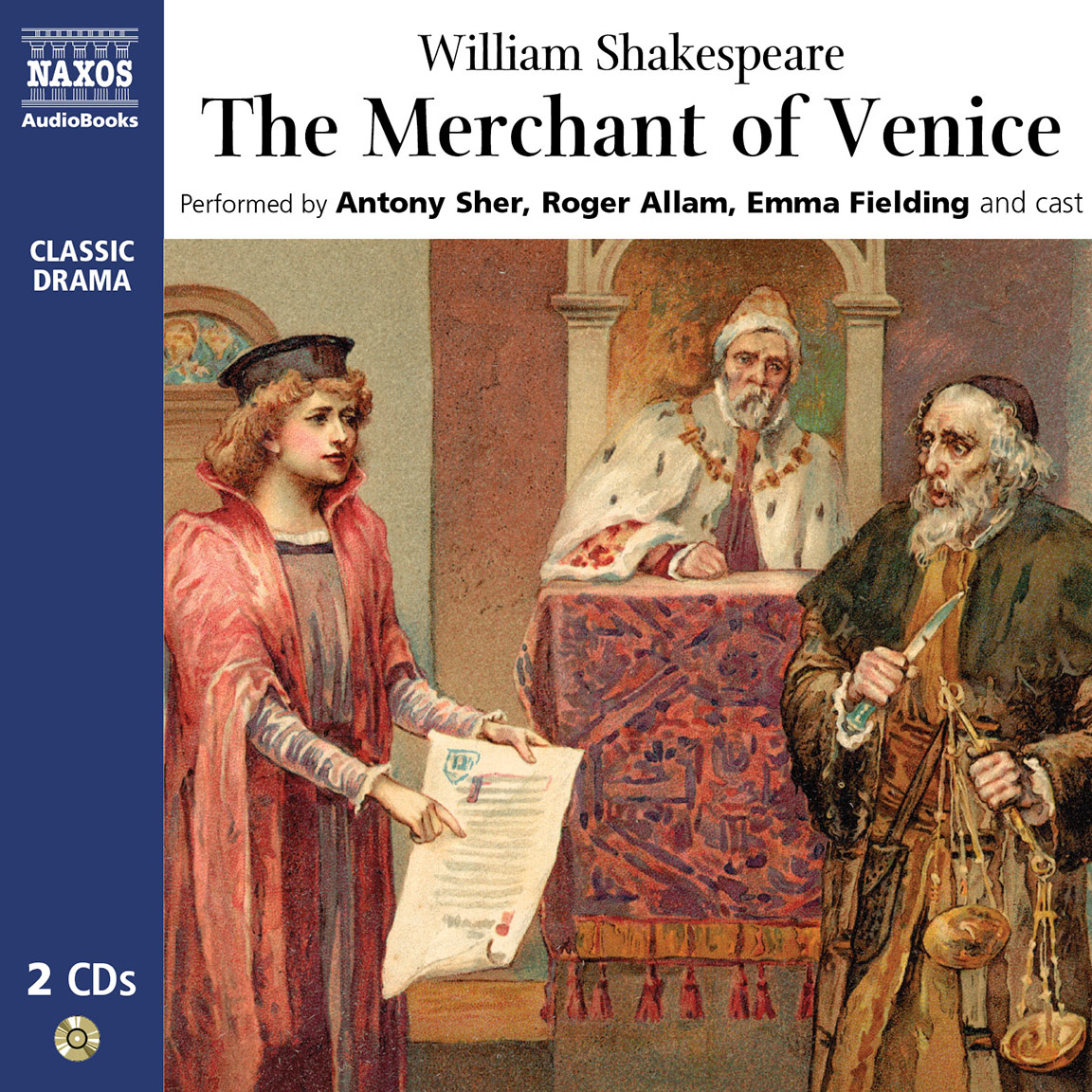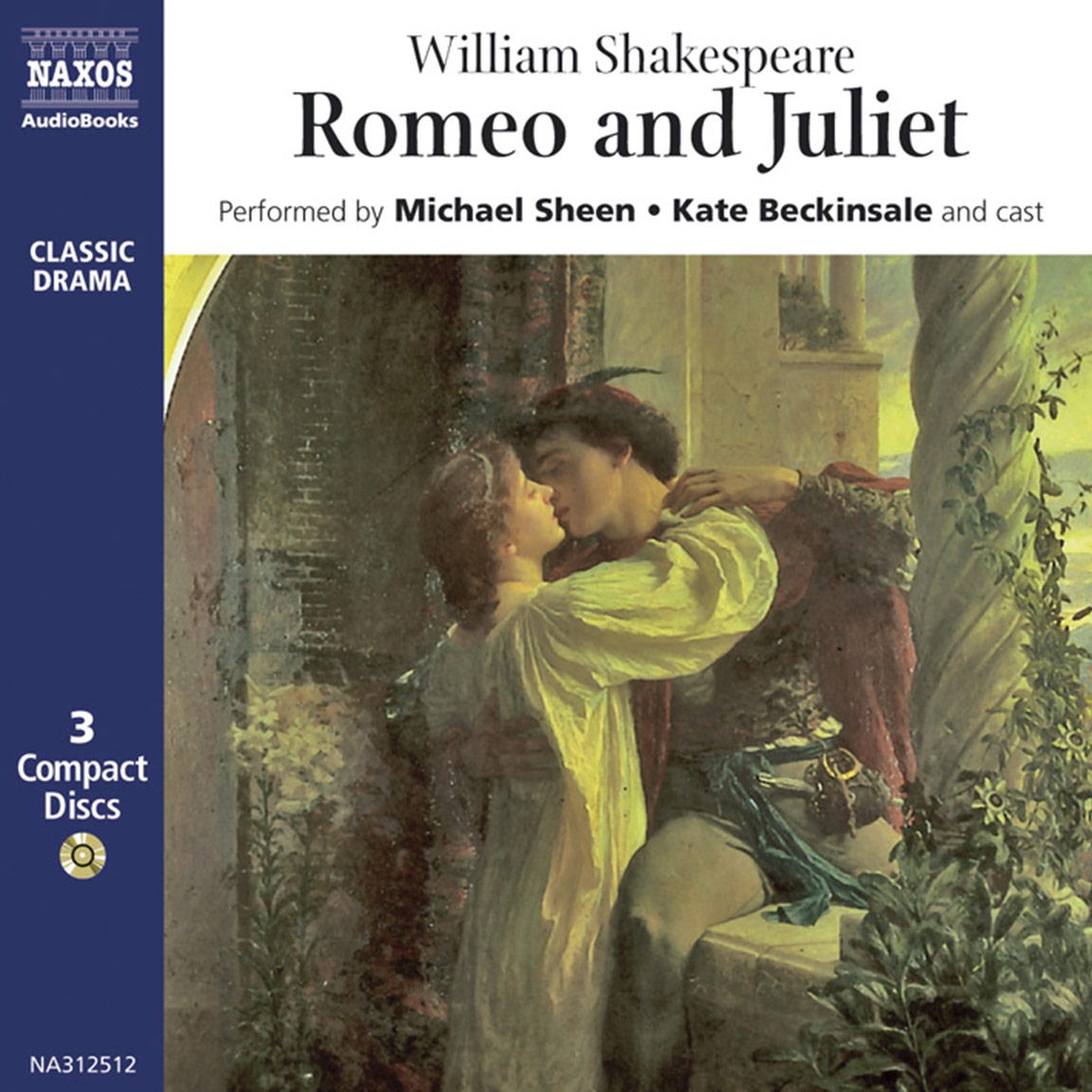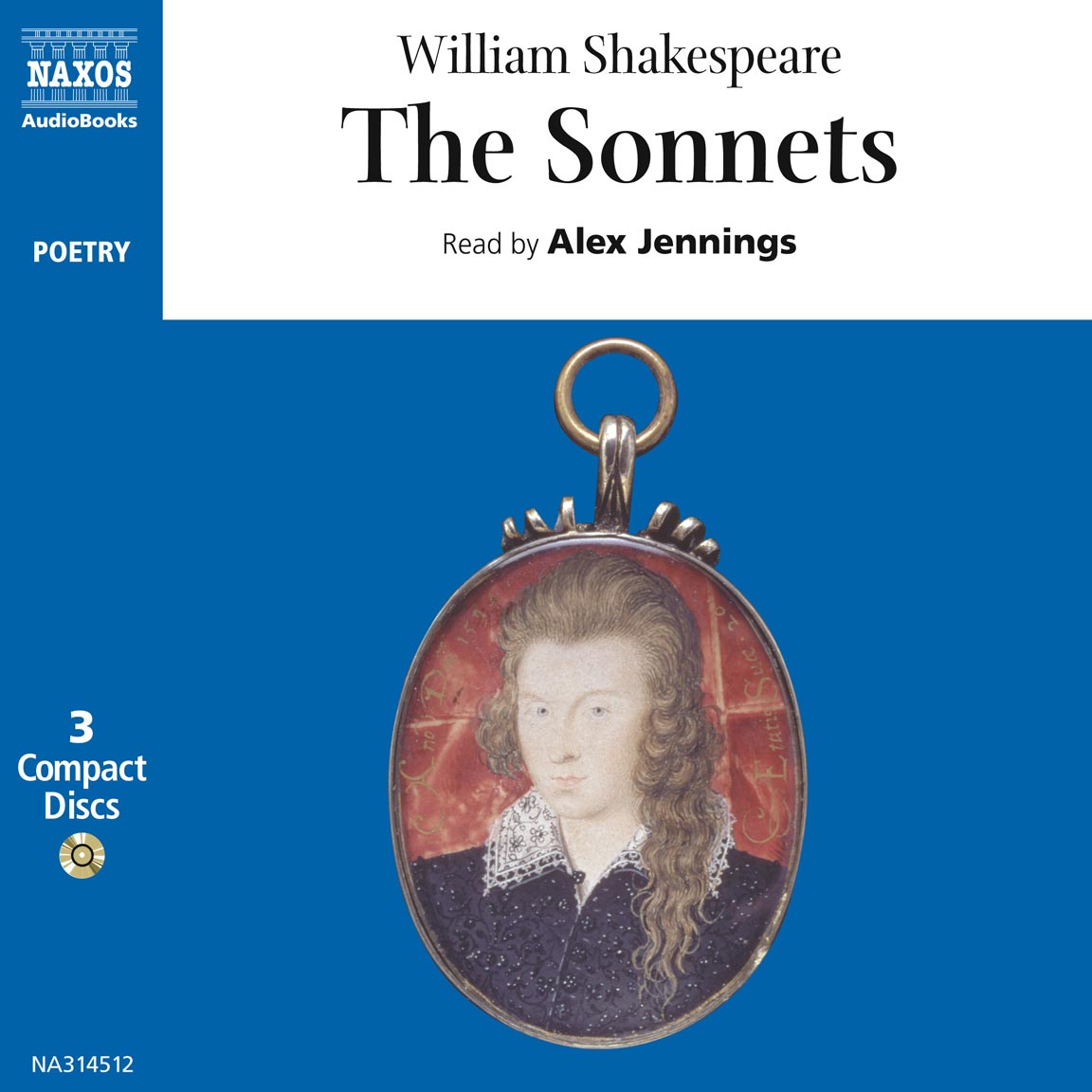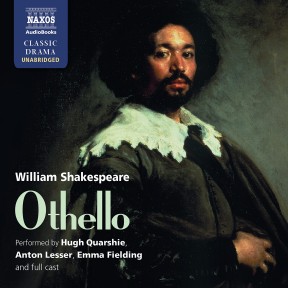
Audio Sample
William Shakespeare
Othello
Directed by David Timson
Performed by Hugh Quarshie, Anton Lesser, Emma Fielding, Patience Tomlinson, Roger May, Alison Pettitt, Roy Spencer, Peter Yapp, John McAndrew, Stephen Thorne & Jonathan Keeble
unabridged
This widely-studied play is one of the best sellers of the Shakespeare canon. This production is the sixth Shakespeare play in the series undertaken by Naxos AudioBooks in conjunction with Cambridge University Press.
-
Running Time: 3 h 01 m
More product details
Digital ISBN: 978-962-954-692-2 Cat. no.: NA320612 Download size: 87 MB Produced by: Nicolas Soames Directed by: David Timson BISAC: DRA010000 Released: June 2004 -
Listen to this title at Audible.com↗Listen to this title at the Naxos Spoken Word Library↗
Due to copyright, this title is not currently available in your region.
You May Also Enjoy
Cast
- Hugh Quarshie
- Othello, The Moor, a general in the service of Venice
- Emma Fielding
- Desdemona, a daughter to Brabantio, and wife to Othello
- Anton Lesser
- Iago, his ancient, a villain
- Patience Tomlinson
- Emilia, wife to Iago
- Roger May
- Cassio, his honourable lieutenant/2nd senator
- Alison Pettit
- Bianca, a courtesan, in love with Cassio
- Roy Spencer
- Duke of Venice/2nd Gentleman/Herald
- Peter Yapp
- Brabantio, senator, father to Desdemona/3rd Gentleman/Gratiano, brother to Brabantio
- John McAndrew
- Roderigo, a Venetian gentleman/1st Gentleman/Sailor (I,iii)
- Stephen Thorne
- Lodovico, kinsman to Brabantio/1st Musician/1st Senator/Messenger (IIi)
- Jonathan Keeble
- Montano, Governor of Cyprus before Othello/Messenger (I,iii)/Clown
Booklet Notes
Othello, dating from 1602-1604, is the second in Shakespeare’s great sequence of four tragedies: preceded by Hamlet (1600- 1601) and followed by King Lear (1605) and Macbeth (1606), it differs markedly from the others in its essentially domestic milieu – the story unfolds with suffocatingly close intensity, unrelieved by the religious or metaphysical context we expect to find in Shakespearean tragedy. There is no sense here of Providence (Hamlet), gods who kill us for their sport (Lear) or the powers above (Macbeth): everything depends upon the actions and motivation of individuals operating within a particular culture.
SOURCES
Shakespeare’s main source for the play was Giraldi Cinthio’s Hecatommithi, first published in Venice in 1566. Shakespeare also used this collection of stories in Measure for Measure; we cannot be sure to what extent he drew on the Italian or French versions, or whether he used a now lost English translation.
The changes made by Shakespeare are, obviously, of special interest. For example, Brabantio, Desdemona’s father, is developed into an influential Venetian senator whose racial bigotry adds significantly to the tension of early scenes and enhances our sense of his daughter’s spirited independence. More generally, the richness of Shakespeare’s language and the depth of his psychological insight transform a simple tale of primitive jealousy (Thomas Rhymer’s bloody farce, perhaps) into an overwhelmingly powerful drama.
There are other, less significant, sources, but of particular interest is Pliny’s Naturalis Historia (translated by Holland, 1601) for some of the more exotic allusions in Othello’s speeches: the cannibals, anthropophagi, hollow caves, mines of sulphur, gum-dropping Arabian trees, chrysolite, mandragora, colloquintida… (for this and much else I am indebted to Norman Sanders’ introduction to the New Cambridge Shakespeare edition of the play).
SYNOPSIS
Act 1 Scene 1: The scene is set in Venice. Roderigo, who fancies himself in love with Desdemona, is angry with Iago, Othello’s ensign, for only now telling him of Othello’s planned elopement with Desdemona. Iago proclaims his hatred of Othello for promoting the less experienced Cassio to the position of personal lieutenant. Iago prompts Roderigo to help him rouse Brabantio by telling him of his daughter’s marriage to ‘an old black ram’.
Scene 2: Iago warns Othello of Brabantio’s pursuit; meanwhile Cassio brings a message requesting Othello’s urgent attendance on the Duke on military business. Brabantio, arriving, is compelled to defer his attempted arrest of Othello and goes also to attend the Duke’s council of war.
Scene 3: The Duke’s appointment of Othello to command the Venetian garrison in Cyprus, threatened by a Turkish fleet, is interrupted by Brabantio’s complaint against Othello. Othello suggests that Desdemona be summoned to account for her actions, and meanwhile tells the story of his wooing: how she fell in love with him as she listened to his tales of travel and adventure. Desdemona then announces her devotion to Othello, and Brabantio is forced to accept the match. Desdemona requests, and is granted, permission to accompany her new husband to Cyprus. She will travel with Iago. Iago, alone with Roderigo, urges him not to despair of winning Desdemona and to come to Cyprus: Desdemona will soon tire of Othello and welcome Roderigo’s advances. Iago, alone, begins to hatch his plot to destroy Othello by convincing him that his wife is having an affair with the handsome young Cassio.
Act 2 Scene 1: Cassio, Iago and Desdemona, and lastly Othello arrive in Cyprus, emerging unscathed from a storm which has providentially destroyed the Turkish fleet. Iago involves Roderigo in a plan to displant Cassio. In his closing soliloquy Iago justifies his plot against Othello and Cassio.
Scene 2: Definite news of the Turkish fleet’s destruction is to be marked by sport and revels that night.
Scene 3: Cassio, who is on duty, is lured into drinking too much by Iago; Roderigo then prompting a brawl, Othello, arriving on the scene, is informed by an apparently reluctant Iago that Cassio was at fault. As a result, Cassio loses his position as Othello’s lieutenant. Iago consoles Cassio and tells him that the best way to recover his reputation with Othello is to ask for Desdemona’s help in pleading his case. Iago, in soliloquy, tells us that he will persuade the Moor that Desdemona’s intercession is prompted by her body’s lust for the young officer.
Act 3 Scene 1: Iago’s good-natured wife Emilia arranges for Cassio to speak with Desdemona.
Scene 2: Othello will meet Iago later in the day.
Scene 3: Iago ensures that Othello observes the figure of Cassio as he leaves Desdemona. Desdemona makes her first plea for the reinstatement of Cassio. Iago warns Othello to observe [Desdemona] well with Cassio, boldly reminding his general that she has already behaved unnaturally in favouring him, and may do so again. Deeply troubled, Othello answers Desdemona distractedly on her return. A handkerchief of Desdemona’s – an earlier present from Othello – is accidentally dropped: Emilia picks it up and decides to give it to Iago, who has a hundred times asked her to steal it. Iago takes the handkerchief eagerly and resolves to leave it in Cassio’s lodging as further evidence of Desdemona’s infidelity. By the time Othello returns he is already a man possessed by the near certainty that his wife is unfaithful. Iago plays on this growing conviction by telling Othello how he recently heard Cassio muttering loving words to Desdemona in his sleep, and that he has seen the precious handkerchief in Cassio’s hand. Iago and Othello swear a sacred vow to punish the guilty lovers.
Scene 4: Desdemona’s failure to produce the handkerchief is further evidence for Othello of her infidelity. Desdemona apologises to Cassio that she cannot press
his case at the moment. Cassio asks the courtesan Bianca to copy the work in the handkerchief which he has found in his chamber, not knowing its owner.
Act 4 Scene 1: Iago tells Othello that Cassio has admitted sleeping with Desdemona: the shock sends Othello into an epileptic fit. Iago then sets up a conversation between himself and Cassio which Othello will observe but not overhear. Iago incites Cassio to lewd laughter by discussing Cassio’s affair with Bianca: Othello duly misinterprets Cassio’s looks and gestures. Bianca enters and, in a jealous rage, refuses to copy the handkerchief; nevertheless she invites Cassio to supper tonight. Othello, now utterly convinced of Desdemona’s guilt, will strangle her in her bed, while Iago will be Cassio’s undertaker. Lodovico arrives from Venice with orders for Othello’s return, his place in Cyprus to be taken by Cassio. Desdemona unwittingly prompts a cruel blow from Othello, witnessed by a shocked Lodovico among others.
Scene 2: Emilia swears to Othello that his wife is faithful. Alone together, Othello accuses Desdemona of being a strumpet and a whore. Emilia begins to suspect Iago of the slander, while Desdemona remains resolutely forgiving of her husband. A discontented Roderigo is persuaded by Iago to kill his supposed rival Cassio later that night.
Scene 3: Supper ended, Desdemona is ordered to bed. Desdemona sings the touching song of willow to her loyal attendant Emilia, who expresses female impatience with the masculine temper.
Act 5 Scene 1: Roderigo and Iago botch the murder of Cassio: Cassio and Roderigo are wounded, the former unaware that Iago attacked him. Othello, believing Cassio dead, passes on towards the marriage chamber. As Lodovico and Gratiano arrive on the scene, Iago eliminates a potential witness by slyly stabbing Roderigo. Bianca appears and is roundly berated by Iago.
Scene 2: Desdemona reacts with angry defiance to Othello’s accusation, but the sympathy she expresses for the supposedly dead Cassio finally prompts Othello to smother her in the bed. Emilia demands to be let into the chamber; Desdemona stirs and speaks before dying. Emilia discovers from Othello that the slandering of Desdemona came from her husband, and rounds in fury on the Moor. When Montano, Gratiano and Iago arrive, Emilia bravely confronts her husband; Othello, realising the dreadfulness of his deed when Emilia spells out the story of the handkerchief, runs at Iago who escapes, mortally stabbing his wife from behind as he does so. Montano pursues Iago while Gratiano guards Othello’s door. Montano, accompanied by Lodovico and the wounded Cassio, returns with the captured Iago. Othello succeeds in wounding Iago who is then removed for torture and questioning. Lodovico shows letters taken from Iago which prove the conspiracy. After a last speech which combines contrition and grandiloquence, Othello stabs himself and dies upon a kiss, falling on the bed where Desdemonalies.
Othello has, in the words of Norman Sanders, had an unbroken stage history from the Restoration to the present day, never suffering from the cycles of popularity and neglect that have been the fate of other plays in the Shakespeare canon. Part of the reason for this continuous interest must have to do with the way in which the audience is irresistibly drawn into the actions and feelings of a small number of key characters: one could indeed argue that the play consists essentially of powerful duets between hero and villain (no wonder Verdi was attracted to it).
But what kind of hero is Othello? If the character is to hold our sympathy at the end of the play–‘Ogull!Odolt!/Asignorantas dirt’ – he must be firmly established at the outset as one whom we can admire, even love. Shakespeare achieves this by showing his effortless, serene authority: ‘Keep up your bright swords, for the dew will rust them’; his amazed tenderness for the young woman who loves him in spite of the fact that he is somewhat declined into the vale of years; and, comprehending these, what Wilson Knight has famously called the Othello music. It is evident above all in the earlier scenes, although it returns – with poignant inappropriateness – in the great, if self-regarding, speeches at the close. When Othello recounts the story of his wooing, the poetry is at once stately, tender, concrete, mellifluous, somehow both personal and rhetorical – even when he is deprecating his ability to speak (using the old device of diminutio), he sounds wonderfully assured: ‘Rude am I in my speech/And little blessed with the soft phrase of peace…’
This approaches urbanity, sophistication: and yet, when the two hours’ traffic of the stage is over, we have seen him reduced to the kind of barbarian that racial bigotry delights in. This is a tricky area. Shakespeare seems to have conceived of his character as a strange combination of Arab prince and conventional black African – the ‘thick-lips’. I think we should not shirk the obvious point that Shakespeare wrote out of the knowledge (or ignorance) of his time. Being Shakespeare, of course, he transforms the conventional prejudice of his day, yet he also confirms it: Othello is indeed noble in his calm authority, his magical yet rational speech, but he is also a savage. This barbarism is implicit in his fit, in his childish superstition (‘of the handkerchief, there’s magic in the web of it’), in his final and absolute loss of control, utterly subservient to the cheap trickery of Iago. Tragically, he understands only a little of the culture he serves: as he says himself, ‘little of this great world can I speak/More than pertains to feats of broil and battle.’ Iago’s perverse achievement is to corrupt and then redirect this military passion into another and wholly inappropriate channel.
Iago’s character has been endlessly discussed. I incline to the view rather engagingly advanced by Giuseppe di Lampedusa (author of The Leopard and notable anglophile):
‘Iago is not some symbolic manifestation of pure Satanic evil, but simply an official who has been passed over for promotion – and to what state envy and bitterness can reduce an individual in this position can easily be understood in a quarter of an hour spent at a regimental mess after the Official Gazette has arrived with this unhappy news in print.’
Clearly this view reduces the mystique of the character: yet how much more horribly real this pettiness is – Iago hasn’t even thought his plan through. True, he improvises cleverly, perhaps brilliantly – but in reality he is very fortunate to achieve as much as he does, and so quickly. Even Iago has underestimated the painfully extreme vulnerability of his victim. Norman Sanders emphasises the imaginative narrowness and relentlessly reductive materialism of Iago, and this seems to me entirely right.
Finally, a word about the structure of the play. Put simply, the problem is this: more is alleged to have happened in the time scheme of the play than is strictly possible. For example, Othello claims to be convinced that his wife has committed ‘the act of shame/A thousand times’, which is clearly impossible. Again, Bianca reproaches Cassio for keeping a week away – yet they have only been on Cyprus for two nights. Such carelessness on Shakespeare’s part really is irrelevant: what the playwright knew very well was that the power of dramatic involvement in a live performance easily outweighs any mathematical exactitude, and that the specific subject of this play – sexual obsession – twists, distorts and ultimately negates the power of reason.
Notes by Perry Keenlyside
THE DIRECTOR, DAVID TIMSON, WRITES:
‘I am not what I am.’
Othello is often referred to disparagingly as a ‘domestic’ tragedy, but I think this is a strength and not a weakness of the play. Othello is not a Prince like Hamlet, or a King like Lear, but a General in the Venetian army, a position he has acquired through his own merits and not by birth. His achievement is all the more remarkable considering he is an outsider, a Moor, and not a Venetian. This image of a self-made man makes Othello one of the most accessible Shakespearian heroes. Modern audiences can identify with the emotions of Othello – we can all recognise Othello’s dilemma, his jealousy of his attractive wife, his doubts about his inadequacies, his suspicion of his friends: his self-doubt and ultimate loss of control are all the stuff of modern domestic drama. Jealousy dominates, and runs in all its forms through the play. The play begins with an expression of jealousy from Iago towards Cassio who he sees as usurping his place, Roderigo is jealous of Othello’s success with Desdemona, Bianca is jealous of Cassio, even the Turks can be said to be jealous of the Venetian empire, but of course the play is dominated by the sexual jealousy of Othello. The play’s ‘domestic’ tone makes it a tragedy for all the characters, not just Othello.
The characters in Othello belong to a tightly-knit society. The Venetians were masters of commerce in the mid-sixteenth century and their society was essentially materialistic. Reputation, who you were and what you were, was of fundamental importance in this society based on money; trust is essential in trade. Shakespeare emphasises the importance of reputation throughout Othello, most significantly through Cassio, who realises only too well that ‘chaos’ and disaster face him without it: ‘I have lost the immortal part of myself, and what remains is bestial.’
Shakespeare makes it clear that our opinions of ourselves and the image we present to the world can be in conflict. Othello appears to be a man of dignified authority when we first meet him, in complete control of himself, yet self-doubt and insecurity prove to be not far beneath the surface, and it is this weakness that Iago so cleverly exploits.
Othello is a play about the perception of one’s fellow man, and the trust and judgment we put in him, essential for a society to function, and what happens when that trust breaks down: ‘chaos’. Iago, described sometimes as the most frightening of Shakespeare’s creations, understands the fragility of a society built on trust and exploits it ruthlessly for his own malicious ends. Only Iago, who everyone in the play believes to be ‘honest’, by clever manipulation maintains his false image to the last moments of the play.
Most of Othello is set in Cyprus, a Venetian colony in the sixteenth century, so the characters are a small band of ex-patriots in a hostile country. The Mediterranean heat and the hostility of a repressed people acts as a catalyst on the domestic situation manufactured by Iago. The foreign environment intensifies and tests all the relationships exposing weaknesses, such as Cassio’s drunkenness, and Desdemona’s lack of experience. Othello too is in a new world of domesticity, not as familiar as ‘feats of broil and battle’. If time had not dictated haste in dealing with the Turks, Othello and Desdemona might have stayed in Venice and within the relative security of Venetian society, Iago may not have had the opportunity to set his plot in motion. The insecurities of Othello and Desdemona, which are magnified when in the unfamiliar surroundings of a garrison town in Cyprus, make the action of the play credible.
As we identify more and more with Othello’s position, the sense of time within the play begins to fragment. Literal time, so evident in the first three scenes of the play, in fact ceases to be important. We are drawn so far into Othello’s fevered mind, that that becomes reality. This is not by any means a straightforward tragedy of a fallen hero, but a tragedy of ordinary men and women, much like ourselves.
